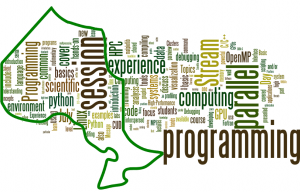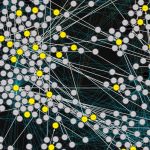The SciNet offices have moved to a new home! We are now located in the MaRS West Tower on the eleventh floor (address: 661 University Ave., Suite 1140 Toronto, ON M5G 1M1). As in our old spot, users, students, and friends are still welcome to visit our new abode, however, because we are still getting settled in, it is recommended to schedule a meeting (by emailing support AT scinet.utoronto.ca).
You will also find the announcement of SciNet course offerings in the 2016-2017 academic year. Users that take a sufficient number of courses can earn one of the SciNet certificates. In addition, many of our courses can now be taken for credit towards PhD and MSc programs by graduate students from several departments across the University of Toronto, including Institute of Medical Sciences, Ecology and Evolutionary Biology, Chemistry, Astrophysics, and Physics.
As always, details on SciNet events are available on the wiki and the SciNet education website.
SUMMARY
- SciNet offices have moved.
- SciNet’s Courses that can also be taken for graduate credit at the University of Toronto:
- Advanced Parallel Scientific Computing
- Introduction to Data Analysis with R
- Introduction to Scientific Computing with Python
- Scientific Computing for Physicists
- SciNet’s Training Events: Intro to SciNet, Intro to Linux Shell, Storage and I/O in Large Scale Scientific Projects, SciNet User Group Meetings.
- HPSS: Now also accessible via Globus.
- GPC: New versions of ParaView and VisIt, and beagle for GPUs available as modules.
- GPC: New web portal with records of your completed GPC jobs available for testing at https://my.scinet.utoronto.ca.
- BGQ: Upgraded toolchain and operating system.
- P8: We now have two Power 8 boxes with GPUs available for testing.
SCINET OFFICE MOVE
The SciNet offices have moved to a new home! We are now located in brand new offices on the eleventh floor of the new MaRS West Tower at the corner of College Street and University Avenue. Our new address is
661 University Ave
Suite 1140
Toronto, ON M5G 1M1
As was the case when we were in our old spot, users, students, and friends are still welcome to visit, however, because we are still getting settled in, we recommend that you first schedule a meeting by emailing support AT scinet.utoronto.ca.
Many of our courses, training sessions and user group meetings will be given in the new location, either in our new conference room or in our new classroom.
EVENTS COMING UP
Unless stated otherwise, all events take place at the SciNet Headquarters, now located on the eleventh floor of 661 University Ave., MaRS West Tower, suite 1140 (look for the bright orange reception area).
Most events will be recorded and some are broadcasted, but only some of the courses can be taken remotely for SciNet certificate credits, as indicated below. All events at SciNet are free but we ask that you enroll on the education website: https://support.scinet.utoronto.ca/education .
Courses that can be taken for credit at the UoT
- ADVANCED PARALLEL COMPUTING
8 Lectures, Tuesdays and Thursdays starting Sept 20, 11:00 am – 12:00 pm
Explore advanced use case examples of parallel computing in scientific research.
The course can be taken as a mini/modular graduate course by Physics, Astronomy, and Chemistry students.
This course counts toward the High Performance Computing Certificate.
For sign up and more information, see https://support.scinet.utoronto.ca/education/go.php/263/index.php
- INTRODUCTION TO DATA ANALYSIS WITH R
12 Lectures, Tuesdays and Thursdays starting Oct 11, 12:00 pm – 1:00 pm
The goal of this course is to prepare students to perform scientific data analysis. Successful students will learn how to use statistical inference tools to gain insight into large and small data sets, as well as be exposed to cutting-edge techniques and best practices to store, manage and analyze (large) data.
For students in the Institute of Medical Science, this course can be taken as “Seminars in Translational Research” (MSC1010Y-1011Y)
Graduate students from the Department of Ecology & Evolutionary Biology (EEB) at UofT can take this course for graduate credit as well. Interested students from the EEB department should contact Prof. Helen Rodd in advance.
Physics, Astrophysics and Chemistry students can take this course as part of the mini/modular graduate courses.
This course also counts toward the SciNet’s Data Science Certificate.
Location: St.George Campus, specific room TBD.
For sign up and more information, see https://support.scinet.utoronto.ca/education/go.php/262/index.php
- SCIENTIFIC COMPUTING WITH PYTHON
8 Lectures, Tuesdays and Thursdays starting Nov 15, 11:00 am – 12:00 pm
Learn about research computing even with little programming experience. Covers basics of programming in Python, best practices and visualization. The course will last 4 weeks with 2 lectures per week.
The course can be taken as a mini/modular graduate course by Physics, Astronomy and Chemistry students. This course can also be taken by students for graduate credits from the Department of Ecology & Evolutionary Biology (EEB) at the UofT. Interested students from the EEB department should contact Prof. Helen Rodd in advance.
This course counts toward the Scientific Computing Certificate and (partially) toward the High Performance Computing Certificate.
Although in-person attendance is highly preferred, SciNet users can take this course remotely by following the lectures online and submitting the assignments.
For sign up and more information, see https://support.scinet.utoronto.ca/education/go.php/264/index.php
- SCIENTIFIC COMPUTING FOR PHYSICISTS
Physics graduate course (PHY1610)
Winter 2017
This course is aimed at reducing your struggle in getting started with computational projects, and make you a more efficient computational scientist. Topics include well-established best practices for developing software as it applies to scientific computations, common numerical techniques and packages, and aspects of high performance computing. While we will introduce the C++ language, in one language or another, students should already have some programming experience. Despite the title, this course is suitable for many physical scientists (chemists, astronomers, …).
This course can be taken for credit by Physics graduate students, and by other graduate students that are allowed to take physics courses, however, they are strongly encourage to check this with their graduate coordinators first.
Part of this course may be given as mini-courses as well. Details on this will follow later.
This course counts toward the Scientific Computing Certificate and the High Performance Computing Certificate.
Although in-person attendance is highly preferred, SciNet users can take this course remotely by following the lectures online and submitting the assignments.
SciNet Training Events
- INTRO TO SCINET
Wed 14th Sept 10:00 am – 11:30 am
The “Intro to SciNet” is a class of approximately 60-90 minutes where you will learn how to use the systems. Experienced users may still pick up some valuable pointers during these sessions.
Participation counts towards the SciNet HPC Certificate.
If you are interested to participate remotely using Google Hangout, please send an email with your gmail address to which we can send the invitation.
Location: SciNet conference room (MaRS West Tower, 11th floor)
For sign up and more information, see https://support.scinet.utoronto.ca/education/go.php/267/index.php
Future “Intro to SciNet” dates and enrollment links:
Oct 12, 10:00 am – 11:30 am: https://support.scinet.utoronto.ca/education/go.php/269/index.php
Nov 9, 10:00 am – 11:30 am: https://support.scinet.utoronto.ca/education/go.php/268/index.php
Dec 14, 10:00 am – 11:30 am: https://support.scinet.utoronto.ca/education/go.php/270/index.php
Jan 11, 10:00 am – 11:30 am: https://support.scinet.utoronto.ca/education/go.php/296/index.php
Mar 8, 10:00 am – 11:30 am: https://support.scinet.utoronto.ca/education/go.php/297/index.php
May 10, 10:00 am – 11:30 am: https://support.scinet.utoronto.ca/education/go.php/302/index.php
- SCINET USER GROUP MEETING
Wed 14th Sept 12:00 pm – 1:00 pm
The SciNet Users Group (SNUG) meetings are every month on the second Wednesday, and involve pizza, user discussion, feedback, and a half-hour talk on topics or technologies of interest to the SciNet community.
Location: SciNet conference room (MaRS West Tower, 11th floor)
For sign up, see https://support.scinet.utoronto.ca/education/go.php/291/index.php
Future “SNUG” dates and enrollment links:
Oct 12, 12:00 noon – 1:00 pm: https://support.scinet.utoronto.ca/education/go.php/292/index.php
Nov 9, 12:00 noon – 1:00 pm: https://support.scinet.utoronto.ca/education/go.php/293/index.php
Dec 14, 12:00 noon – 1:00 pm: https://support.scinet.utoronto.ca/education/go.php/294/index.php
Jan 11, 12:00 noon – 1:00 pm: https://support.scinet.utoronto.ca/education/go.php/295/index.php
Feb 8, 12:00 noon – 1:00 pm: https://support.scinet.utoronto.ca/education/go.php/298/index.php
Mar 8, 12:00 noon – 1:00 pm: https://support.scinet.utoronto.ca/education/go.php/299/index.php
Apr 12, 12:00 noon – 1:00 pm: https://support.scinet.utoronto.ca/education/go.php/300/index.php
May 10, 12:00 noon – 1:00 pm: https://support.scinet.utoronto.ca/education/go.php/301/index.php
- STORAGE AND I/O IN LARGE SCALE SCIENTIFIC PROJECTS
Wed 21th Sept 09:30 am – 5:00 pm
Location: SciNet classroom (MaRS West Tower, 11th floor)
Learn how to pinpoint and alleviate bottlenecks in large data-driven research projects. Techniques such as tar, compression, ramdisk, file format options, and job scheduling techniques will be covered.
For sign up, see https://support.scinet.utoronto.ca/education/go.php/265/index.php
- INTRODUCTION TO THE LINUX SHELL
Wed 19th Oct 10:00 am – 1:00 pm
The Linux shell (command line, or however you want to phrase it) is the most basic Linux interface that there is. If you don’t know what the Linux shell is then you need to take this course!
In this course, you will learn the basics of how to use the Unix shell in three hours. Includes a mild introduction to bash scripting as well. This course counts toward the Scientific Computing Certificate.
Location: SciNet classroom (MaRS West Tower, 11th floor)
For sign up and more information, see https://support.scinet.utoronto.ca/education/go.php/266/index.php
SYSTEM CHANGES
Note that most software changes for the GPC also hold for Sandy and Gravity.
- HPSS: If you have an HPSS account, this is now also accessible from the Globus file transfer web-interface. Globus is accessible through https://globus.computecanada.ca, where you’d login with your Compute Canada account, while the name of the HPSS endpoint is “Compute Canada HPSS”, for which you separately authenticate with your SciNet account. For more information on using Globus, see https://docs.computecanada.ca/wiki/Globus .
- GPC: New web portal with records of your completed GPC jobs available for testing at https://my.scinet.utoronto.ca.
- GPC: Beagle GPU-version available for testing under the use.experimental module.
- GPC: Python distribution Anaconda v4.x installed as a module
- GPC: VisIt version 2.10.2 installed as a module
- GPC: ParaView version 5.1.0 installed as a module
- GPC: Versions 15.0.6 and 16.0.3 of the Intel Compilers are installed as modules.
- GPC: Version 6.0 of Allinea Forge (containing the DDT parallel debugger, the profiler MAP and Performance Reports) installed as a module.
- GPC: Gromacs v. 5.1.1 installed as modules (GPU and non-GPU).
- GPC: Chemistry package Cantera installed as a module.
- BGQ: Upgraded compute nodes and toolchain to V1R2M4 from V1R2M2. Note that this means that when recompiling applications, one has to start from scratch (i.e., no old object files).
- BGQ: Front end nodes operating system was updated to RedHat 6.7. This should not change much for users.
- P8: A new P8 system with two Power-8 machines, each with two NVIDIA Tesla K80 GPUs, is available for testing. For details, see wiki.scinet.utoronto.ca/wiki/index.php/P8
WHAT ELSE HAPPENED AT SCINET IN THE SUMMER OF 2016?
- April: Participation of SciNet in Science Rendezvous 2016.
- May: Visualization tutorial at 2016 “Chemical BioPhysics Symposium” and Best Practices at GLBIO 2016.
- June: Participation of SciNet’s personnel at Canheit-HPCS 2016 (Edmonton, Alberta), and ISC (Frankfurt, Germany).
- June: Participation of SciNet’s personnel at the International HPC Summer School (Ljubljana, Slovenia)
- June: Intro to SciNet
- June: SciNet User Group Meeting
- June 21-26: International Summer School on HPC Challenges
- May/August: Participation of SciNet’s personnel at the other instance of Ontario HPC Summer School 2016 (Hamilton and Ottawa)
- July 11-15: Ontario HPC Summer School 2016 – Central
- August 14-19: As part of the “2016 Industrial Problem Solving Workshop” to be hosted at the Fields Institute, SciNet will provide an introduction to High Performance Computing resources, as well as support for participants who decide to tackle this problems numerical utilizing supercomputer resources.










